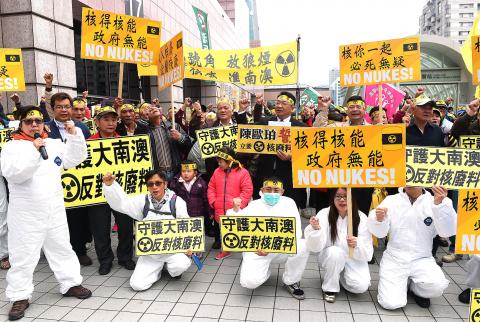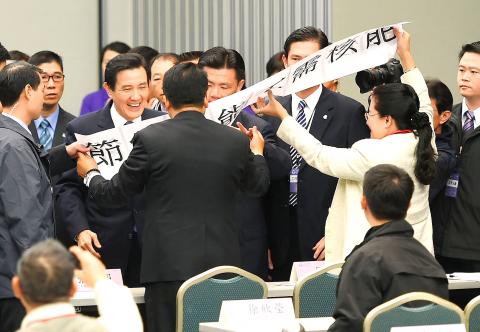Taiwan should not arbitrarily abandon any energy options if it does not want to suffer from electricity shortages, President Ma Ying-jeou (馬英九) told the National Energy Conference yesterday.
Addressing the two-day conference, which opened in Taipei yesterday, Ma agreed with calls for Taiwan to phase out nuclear power, but proposed doing so gradually and in a way that would not cause power shortages, increase electricity rates or violate the nation’s commitment to reducing carbon emissions.
“Since several coal-fired power plants are scheduled to be decommissioned in a matter of years, and the Fourth Nuclear Power Plant was designed to close the subsequent gap in energy, Taiwan could face electricity shortages or rationing in the near future,” he said.

Photo: Chang Chia-ming, Taipei Times
The right mix of energy sources for the nation’s energy requirements should be sufficient, affordable, sustainable, reliable and clean, he added.
Citing the results of evaluations conducted by the Intergovernmental Panel on Climate Change and the International Energy Agency last year, he said that nuclear energy is a mature baseload energy source with low greenhouse gas emissions, and that the proportion of nuclear power in the global energy supply will remain at roughly 12 percent until 2040.
Renewable energy sources, despite having been forecast to make the biggest leap by 2040 to make up 33 percent of overall supply, will be largely constituted by hydroelectric power, and the proportion made up of solar and wind energy will not be overwhelming, he said.

Photo: Chang Chia-ming, Taipei Times
Ma said he hoped the two-day event would “at least help to summarize objective facts” regarding the energy source options available to the nation, thereby helping parties with disparate views on Taiwan’s energy policies put aside their differences and arrive at a consensus.
After his opening remarks, Ma was met by Democratic Progressive Party legislators Chen Ou-po (陳歐珀) and Tien Chiu-chin (田秋堇) beside the stage, who held a banner that read: “Promote green energy and energy conservation. We don’t need nuclear power.”
Shortly before the conference, the duo led about 200 residents from Yilan County’s Dananao area (大南澳) in a protest outside the conference against what they said was a clandestine government plan to bury nuclear waste in their hometown.
Chen said that the Bureau of Energy and the Atomic Energy Council had secretly established an underground laboratory designed to run analyses on the geology close to the border of Dananao and Hualien County’s Sioulin Township (秀林) — a plot known as “Area 146” — as part of the government’s plan to store more than 20,000 highly radioactive spent fuel rods in the area.
Tien said the vast majority of Yilan residents have long opposed the use of nuclear energy, and disposing of nuclear waste in Dananao would be unfair to the Aboriginal people living there, as it would mar one of the nation’s most beautiful areas. The protest was comprised of a coalition of environmental protection groups, who criticized the government for its procrastination in developing renewable energy sources and refusing to set carbon reduction goals despite the Basic Environment Act (環境基本法) — enacted in 2002 — which clearly states that the government should implement plans to achieve the goal of a nuclear-free nation.
Green Citizens’ Action Alliance secretary-general Tsuei Su-hsin (崔愫欣) said that a draft bill for levying an energy tax to promote energy conservation was still an option, as the idea was included in the conclusions reached during the previous energy conference in 2005.
Citizen of the Earth, Taiwan director Tsai Chung-yueh (蔡中岳) panned what he said was the event organizers’ “authoritative” attitude toward the general public, saying they claimed that they would consider public opinion gathered during regional meetings, but arrived at the assembly without a solution.
Northern Coast Anti-Nuclear Action Alliance chairperson Hsu Fu-hsiung (許富雄) decried what he said was an opaque “black box” vetting process by the energy bureau in determining participants of the National Energy Conference, which had excluded him and many of his fellow anti-nuclear activists.

CHAOS: Iranians took to the streets playing celebratory music after reports of Khamenei’s death on Saturday, while mourners also gathered in Tehran yesterday Iranian Supreme Leader Ayatollah Ali Khamenei was killed in a major attack on Iran launched by Israel and the US, throwing the future of the Islamic republic into doubt and raising the risk of regional instability. Iranian state television and the state-run IRNA news agency announced the 86-year-old’s death early yesterday. US President Donald Trump said it gave Iranians their “greatest chance” to “take back” their country. The announcements came after a joint US and Israeli aerial bombardment that targeted Iranian military and governmental sites. Trump said the “heavy and pinpoint bombing” would continue through the week or as long

TRUST: The KMT said it respected the US’ timing and considerations, and hoped it would continue to honor its commitments to helping Taiwan bolster its defenses and deterrence US President Donald Trump is delaying a multibillion-dollar arms sale to Taiwan to ensure his visit to Beijing is successful, a New York Times report said. The weapons sales package has stalled in the US Department of State, the report said, citing US officials it did not identify. The White House has told agencies not to push forward ahead of Trump’s meeting with Chinese President Xi Jinping (習近平), it said. The two last month held a phone call to discuss trade and geopolitical flashpoints ahead of the summit. Xi raised the Taiwan issue and urged the US to handle arms sales to

State-run CPC Corp, Taiwan (CPC, 台灣中油) yesterday said that it had confirmed on Saturday night with its liquefied natural gas (LNG) and crude oil suppliers that shipments are proceeding as scheduled and that domestic supplies remain unaffected. The CPC yesterday announced the gasoline and diesel prices will rise by NT$0.2 and NT$0.4 per liter, respectively, starting Monday, citing Middle East tensions and blizzards in the eastern United States. CPC also iterated it has been reducing the proportion of crude oil imports from the Middle East and diversifying its supply sources in the past few years in response to geopolitical risks, expanding

Pro-democracy media tycoon Jimmy Lai’s (黎智英) fraud conviction and prison sentence were yesterday overturned by a Hong Kong court, in a surprise legal decision that comes soon after Lai was jailed for 20 years on a separate national security charge. Judges Jeremy Poon (潘兆初), Anthea Pang (彭寶琴) and Derek Pang (彭偉昌) said in the judgement that they allowed the appeal from Lai, and another defendant in the case, to proceed, as a lower court judge had “erred.” “The Court of Appeal gave them leave to appeal against their conviction, allowed their appeals, quashed the convictions and set aside the sentences,” the judges